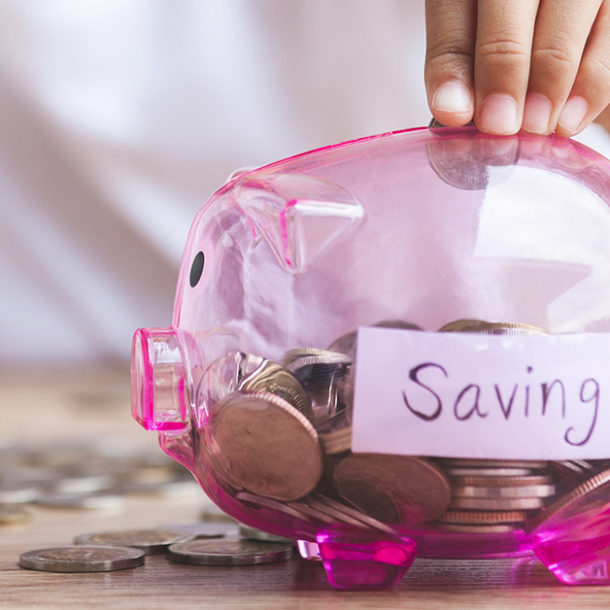
How to Reduce Your Monthly Expenses
According to a CareerBuilder survey, 78% of Americans live , and that was before the cash crunch that landed on many households during COVID-19. If you find yourself short on cash every month, one of the best strategies you can develop is looking at your budget for expenses you don’t really need.
Below, we’ll share some tips for reducing monthly expenses along with specific examples of unnecessary monthly costs.
Tips for Reducing Your Monthly Expenses
1. Make a Budget
Making a budget allows you to:
- Understand how much you earn and how much you spend
- Make adjustments so that you spend less than you make
- Save some of what’s leftover
A popular budgeting approach uses the 50-30-20 rule. With this model, you allocate 50% of your income to basic needs such as housing, utilities, food, taxes, car insurance payments, and credit card bills. A further 30% goes towards non-essential items such as entertainment and eating out. The final 20% is dedicated to savings.
Look online for customizable apps that can help you budget and track your spending to keep you moving in the right direction financially. Many of these are free or are available at a low cost, and you can access them via your smartphone.
2. Lower Your Housing Expenses
A rent or mortgage payment is many people’s most significant monthly expense. There are several ways you can reduce your housing costs:
- If you’re renting, consider getting a roommate or opting out of your paid parking space.
- If you’re a homeowner, find out if it’s possible to negotiate a lower interest rate with your lender or speak to a private mortgage insurance company about getting a cheaper home insurance deal.
3. Go After Your Debts
Here are a few practical steps to rid yourself of the burden of debt:
- Make a list of every single debt that you currently have, starting with the smallest through to the largest. (Note, if you’re a homeowner, exclude your property from this list.)
- Begin paying off your smallest debt first while paying just the minimum monthly payments on all your other debts.
- Once the first debt is paid off, cancel the line of credit. Then go after the next-smallest debt on your list in the same way.
- Repeat the process until you’re debt-free.
Debt consolidation is another option. With this approach, you combine multiple debts into a single monthly payment, which can drastically cut expenses. The objective of debt consolidation is to reduce the amount you pay in interest and, ultimately, pay all your debts off entirely.
4. Shop with a List
It’s all too easy to give in to impulse buying when you’re out shopping. If you find yourself prone to buying unnecessary items, get into the habit of making a shopping list ahead of every trip. Another tried and true strategy is never to go shopping when you’re hungry!
Also, find out which of your local grocery stores offer rewards programs and compare the different options.
5. Reduce Your Utility Bills
There are several small things you can do around the house to make a big difference in reducing your monthly utility bills. For example, you can save money by:
- Replacing incandescent light bulbs with LEDs
- Unplugging electrical devices when they’re not in use
- Lowering your water heater’s temperature
- Switching off your lights every time you leave a room
- Immediately repairing any leaky toilets and faucets
- Not taking lengthy showers
6. Put Away Your Credit Cards
Credit cards are a fast and convenient way to pay for goods and services without having to draw cash. However, this also makes them too easy to use to pay for non-essential items such as luxury goods or expensive dinners out.
Consider putting your credit card away or leaving them at home when you go out. Committing to spending only cash will force you to think about and account for every dollar you spend, eliminate costly credit card debt, and reduce the likelihood of living beyond your means.
7. Eliminate Unnecessary Monthly Expenses
Take a look at your recurring monthly expenses and see where there are opportunities to “trim some fat.” For example, you may be able to cut back in the following areas:
Ditch an Expensive Cell Phone Plan
In the 2020s, most people would call a working cell phone a need, not a want. But that doesn’t mean you need the latest phone the day it comes out or an expensive unlimited data plan. Many people use only a couple of gigabytes of data per month and could save a bundle by cutting back to a pay-per-gig phone plan. Spend some time comparing the many plans available.
Struggling to make your phone payments? Check out Payactiv: Payactiv enables you to access your paycheck before payday with Earned Wage Access (EWA). If you’ve already worked the hours, you can use the Payactiv app to get paid before payday. It’s not a loan, so there are no interest charges, and there’s nothing to pay back. Learn more here.
Rationalize Your Cable TV Package
If you want to cut monthly expenses, cable TV is a good place to start. Cable subscriptions can easily cost more than $100 per month or $1,200 per year. When you use a streaming service or two instead, you’ll probably pay under $40 per month. That’s a significant saving. Just don’t go too crazy signing up for every streaming service out there, or you could wind up paying more than you would for cable. Almost all providers now have “skinny bundles,” which allow you to choose only the channels you want, which can offer substantial savings.
Cancel Subscriptions You Don’t Use
If you’re already using streaming services instead of cable, take a look at those subscriptions to make sure they’re all worth the cost for you. Also, look at subscription meal services, monthly boxes, “of the month” clubs, software subscriptions, and anything else you pay for automatically. Every time you cut a subscription, the savings start adding up the next month.
Cut Back on Daily Lunches or Coffees Out
If you love a certain restaurant near where you work or enjoy a morning stop at a favorite coffee shop, there’s no reason you can’t indulge every once in a while. But if you’re tight on funds, this is an easy place to cut monthly expenses and save money. Even if it isn’t as good, the free coffee at work doesn’t cost you anything. Bringing your lunch most days is also typically much cheaper than going out for a sandwich, salad, burrito, or another treat.
Don’t Pay for Credit Monitoring
Keeping tabs on your credit report is important for your long-term financial health. Many companies are happy to sell you a subscription that gives you all three of your credit reports, credit scores, and credit monitoring. But savvy consumers know you can get most of that for free, including powerful credit monitoring. By law, you can get your credit report for free at AnnualCreditReport.com. Credit services like Credit Karma and Credit Sesame include your credit report, credit score, and credit monitoring – all for free.
Shop Around for Lower Insurance
Making sensible adjustments to your home and car insurance is another way to reduce your monthly expenses. Set a little time aside to shop around for cheaper rates. The best insurers will be prepared to give you a discount if you have a record of being a responsible homeowner and a safe driver. In addition, many will offer discounts if you have smoke and carbon monoxide detectors and burglar alarms installed in your home.
Pay Only with Cash
When you’re paying for everything with debit or credit cards, it’s easy to lose track of how much you’re actually spending. A great way to keep tabs on every dollar and cent you spend is to only use cash to pay for goods. Set aside a certain amount of money each week and spend only that amount.
Say “No” to Payday Loans
Payday loans are high-interest, short-term, predatory loans and should be avoided at all costs. Look for alternatives, such as Earned Wage Access services, which allow you to access earned income before payday. Earned Wage Access isn’t a payday loan. It’s an early payday for money you’ve already worked for and earned. With Payactiv Earned Wage Access (EWA), you can access up to 50% of the income you’ve already earned whenever you need it. Learn more about Payactiv.
Get Active
Instead of driving everywhere (which will mean regular, hefty payments at the fuel pump) or paying for an expensive gym membership, get on your bike, walk around the park, or start lifting weights at home.
Make Your Own Gifts
The cost of gifts for birthdays, holidays, and special events can quickly add up. If you enjoy painting, baking, or sewing, why not put your creativity to work and save money at the same time? Everyone appreciates receiving homemade gifts with a personal touch.
Use Apps to Get Cash Back
Get savvy with apps that give you discounts, rebates, or points applied to future purchases. Most cash-back apps are completely free, which means they’re great tools for managing and boosting your personal finances.
Ask Your Employer about Earned Wage Access
Earned Wage Access is becoming an increasingly popular company benefit offered by employers. It provides a means for you to access wages that you’ve accrued but not yet collected before your regular payday. Your funds can be loaded onto a debit or prepaid card, transferred to your bank account, or even picked up as cash at Walmart.
With Payactiv’s Earned Wage Access service, you can even use your earned wages to pay for Uber rides or Amazon purchases directly via an app on your smartphone. It’s a great way to avoid having to incur credit card debt or take out loans to fund unforeseen or emergency expenses.
So, why not suggest that your employer check out our offering?
Take Charge of Your Monthly Income and Expenses
If you don’t pay close attention, it’s easy for your financial situation to get out of control. A good budget, Earned Wage Access, and cutting back on expenses that don’t bring value to your life are all strategies that can turn financial fragility into financial stability.
If you need a little extra help, make sure to check out Payactiv’s integrated budgeting and savings tools, which are available for free to all members. We even give everyone free access to financial counseling. If you don’t have Payactiv at your workplace, tell your HR department that you want the Payactiv benefit. It’s a win-win for employers and employees. Learn more about how it works today.
For more helpful tips and tricks on reducing your expenses and getting out of debt, check out the Payactiv blog.
Get Payactiv for your business
Related Articles
Unexpected expenses can sneak up on the best of us and derail our finances...
For many people, their first big purchase is their first car You need a vehicle...
When starting your personal finance journey, you’ll find that many experts...
© 2025 Payactiv, Inc. All Rights Reserved
24 hour support: 1 (877) 937-6966 | [email protected]
* The Payactiv Visa Prepaid Card and the Payactiv Visa Payroll Card are issued by Central Bank of Kansas City, Member FDIC, pursuant to a license from Visa U.S.A. Inc. Certain fees, terms, and conditions are associated with the approval, maintenance, and use of the Card. You should consult your Cardholder Agreement and the Fee Schedule at payactiv.com/card411. If you have questions regarding the Card or such fees, terms, and conditions, you can contact us toll-free at 1-877-747-5862, 24 hours a day, 7 days a week.
** Central Bank of Kansas City does not administer, nor is liable for earned wage access.
Payactiv holds earned wage access services (EWA) license number 2591928EWA with the Wisconsin Department of Financial Institutions.
Apple and the Apple logo are trademarks of Apple Inc., registered in the U.S. and other countries. App Store is a service mark of Apple Inc., registered in the U.S. and other countries.
Google Play and the Google Play logo are trademarks of Google LLC.
Galaxy Store and the Galaxy Store logo are registered trademarks of Samsung Electronics Co., Ltd.




